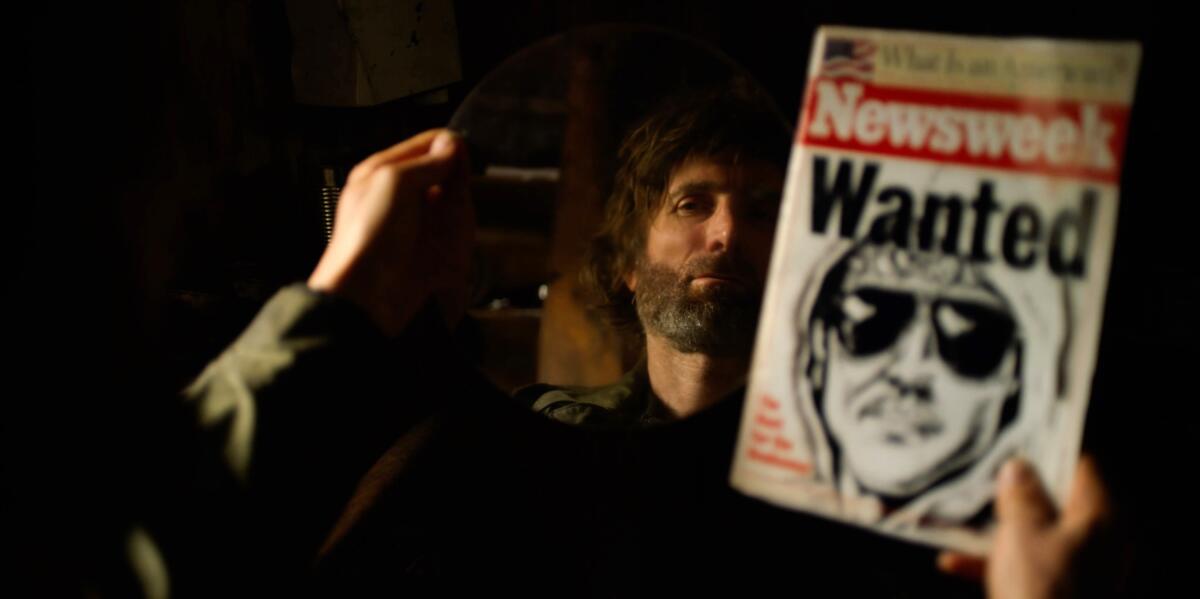Review: Mail-bomber Ted Kaczynski’s instability comes into vivid focus in the biopic ‘Ted K’

- Share via
Nature lovers aren’t all hermits, hermits aren’t necessarily survivalists, and survivalists don’t have to be terrorists, and they certainly aren’t all intellectuals. But notorious mail-bomber Ted Kaczynski was all of these, even as his legacy became one of madness above everything. It’s why his Jeremiah Johnson-meets-Travis Bickle existence, which produced the longest manhunt in FBI history before his capture in 1996, seized the country’s imagination — once it stopped troubling its sense of everyday safety.
Kaczynski was his own bundle of nerves as a self-styled David fighting the Goliath of a technology-ruled society. And actor Sharlto Copley wrings that energized instability for all its worth in filmmaker Tony Stone’s vividly rendered “Ted K,” an impressionistic biopic determined to venture into the polluted habitat that was the Unabomber’s brain.
For your safety
The Times is committed to reviewing theatrical film releases during the COVID-19 pandemic. Because moviegoing carries risks during this time, we remind readers to follow health and safety guidelines as outlined by the CDC and local health officials.
Stone’s most recent film was the captivating documentary “Peter and the Farm,” which painted one beaten-down man’s agrarian life as a cycle of beauty and suffering. Now, Stone has tackled the most sanity-fraying version of that kind of ideal-driven solitude, but with a documentarian’s adherence to verisimilitude: using Kaczynski’s voluminous writings as fodder for narration (“modern technology is the worst thing that ever happened to the world”); crafting moments from original interviews with Montanans who knew him; and even filming in the places around Lincoln, Mont., where the Harvard-educated neo-primitive lived and roamed, going so far as to construct a replica of his off-the-grid cabin in its original spot.
But “Ted K,” with its occasionally hot-colored palette and flights of fantasy, is a piece of reality-massaged filmmaking, centered in Copley’s immersive portrayal and a quasi-horror vibe that aims for a subjective filmic space where the call of the wild meets the churnings of the possessed. There are slowly pushing zooms and classical music swatches that recall the eeriness of Kubrick at his most fascinated by insanity, and sometimes ominous sonic strains from composer Blanck Mass that would fit inside a John Carpenter slasher flick.
We first encounter Kaczynski (with no date given, but likely the late ’70s) as a hidden figure in the trees watching a rich family snowboarding, then, after they’ve left for the season, breaking into their house and trashing it with an ax. In town, he’s a bicycle-riding fixture (“Hi, Ted” a common shout-out), doing the occasional volunteer work or odd job and sometimes calling his mom and brother on a payphone, asking them for money while deriding their empty divorced-from-nature lives.
But the increasing encroachment of roaring, sawing, earth-moving development projects — just the sound of jets overhead spurs tears of rage — turns him toward sabotaging equipment, firing his rifle at aircraft and perfecting his bomb-building. It’s on an out-of-state mission to plant an explosive near a computer store when his carefully disguised hoodie/curls/aviators look earns him the iconic witness sketch, while his threatening letters to publications and promise of further killings begin to earn him national infamy. (Snatches of archival news clips from radios and motel TV sets keep sort of a timeline.)
While there’s no mistaking “Ted K” as a portrait of someone mentally ill, there’s a hauntedness in Copley’s raving eyes that wants us to consider what’s lost when someone initially motivated to preserve, and ostensibly right about the perils of technology, becomes an agent of destruction himself. The key to this committed portrayal is that we sense little joy in this chosen isolation and autonomy, that the unspoiled beauty around him had been subsumed by the apocalypse in his head until criminal vengeance was all that was left.
That being said, a little of Ted Kaczynski can go a long way — especially at two hours — even as one’s appreciation for Copley’s intensity and cinematographer Nathan Corbin’s artful shotmaking never wanes. But in the well-trod realm of forensic examinations of the notorious, Stone’s considered hike into the life and times of a very American-made extremist does have undeniable power.
‘Ted K’
Rating: R, for language, some sexual content and brief nudity
Running time: 2 hours, 2 minutes
Playing: In general release Feb. 18
More to Read
Only good movies
Get the Indie Focus newsletter, Mark Olsen's weekly guide to the world of cinema.
You may occasionally receive promotional content from the Los Angeles Times.










